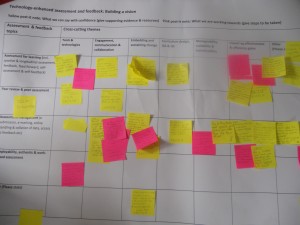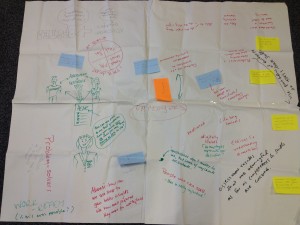Birmingham was a hive of activity last week as the Assessment and Feedback programme came together to work towards the development of a shared vision around this theme. It had been a year since all the projects met face-to-face so the aim was to provide opportunities for networking and sharing project outputs and outcomes as well as considering issues such as strategies for managing and sustaining change, evaluation approaches and technical developments.
The day started with a ‘market place’ activity where projects shared their ‘wares’ i.e. specific outputs and resources that would be of use to other institutions. The ‘buyers’ were asked to consider what would be useful to them and what action they would take as a result of engaging with these resources (see the Design Studio). The institutional projects (strand A) also produced some short videos updating on the development of their work.
This was followed by an activity which explored what projects felt they had to contribute to a set of key emergent ‘Transforming Assessment and Feedback’ themes which are being developed in the Design Studio. These point to current understanding and resources around topics such as peer assessment and assessment for learning and the gaps this programme hopes to fill in these areas. It helped to surface and distinguish between what projects can tentatively or confidently say about these areas at this point in time.
We rounded off the visioning exercise at the end of the day through a ‘World Café’ inspired approach looking at four different lens on this vision from learners’, practitioners’, employers ‘and the institutions’ perspectives. Here is an example of how some of the discussion mapped out:
Sustaining and embedding change was also a separate topic of discussion for the institutional projects (strand A). Prof David Nicol revisited the area of educational principles as discourse which he has discussed previously with the project teams. The focus this time was very much on principles in practice – showing how principles-based strategies can bring about institutional change in assessment and feedback practice as demonstrated by the Viewpoints project at the University of Ulster. The project, led by Alan Masson, developed a tool based on the REAP principles and using the Hybrid Learning Model which engages curriculum teams in a conversation around effective assessment and feedback strategies. The principles (written on cards) are not directive but act simply as a tool for dialogue, decision-making and action planning. (See also the Viewpoints evalutation which shows the benefits of this approach).


